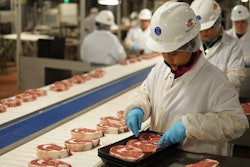
BRF is selling its Argentinian pork business, Campo Austral, as part of its plan to divest of all of the company’s assets in Argentina.
The Brazil-based company, in an announcement to the market on the BRF website, stated that it sold Campo Austral for a price of US$35.5 million to two buyers.
Campo Austral operates three plants in Argentina, and those three plants have a combined slaughtering capacity of about 2,300 hogs per day and a processing capacity of about 2,144 metric tons per month, including processed and fresh products.
The plant in Florencio Varela and all assets and liabilities related to it, including the brands Bocatti and Calchaqui, are being sold to the Argentinian society BOGS SA. The Campo Austral plants in Sand Anres de Giles and Pilar, as well as the Campo Austral brand, are being sold to Argentina’s La Piamontesa de Averaldo Giacosa y Compania SA.
The proposed transaction remains subject to regulatory approval.
Other divestitures in Argentina
If all proposed sales are approved, BRF will have divested of all Argentinian assets. On January 2, the company revealed that it had completed its divestiture of another subsidiary, Quickfood, selling that business to another Brazil-based company, Marfrig Global Foods.
BRF in December also revealed it was selling its Argentinian poultry subsidiary, Avex. Under that agreement, Avex would be acquired for US$50 million through a joint venture between Graja Tres Arroyos and Fribel. Avex operates three plants in Argentina. Those plants are located in Llavalol, Villa Mercedes and Rio Cuarto. Avex has a slaughtering capacity of 160,000 birds per day.
BRF, which has been struggling financially in recent years, announced in June 2018 that it planned to divest of not only its assets in Argentina, but also in Europe and Thailand. In doing so, BRF was to focus more of its efforts in markets where it is more successful, specifically, in Brazil, Asia and in geographic regions with a high Muslim population.


















